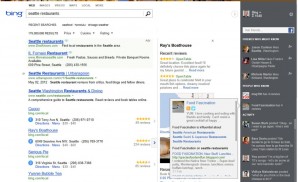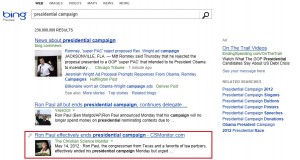| May 18, 2012
I See Your “Search Plus Your World” and Raise You a “Social Sidebar”
Search results have gone social. There’s no doubt about it.
Earlier this year, I wrote about Google releasing its own social network, Google+, and quickly integrating that content into regular search results for those visitors who are logged into a Google account.
Bing is now taking a similar leap, re-vamping its entire search interface to include a social sidebar on the right-hand side of the results page. Where Bing had previously integrated some social information directly into search results, it’s now mainly pulling it off to the side in order to assist in the search experience instead of compete with it.
Image via Microsoft News Center.
Bing’s rolled out a lot of new features as part of the “New Bing.” I won’t go into all of them here since other experts have done such a thorough job explaining them in detail. I will pull out a couple of the elements that I feel are especially significant, as both a searcher and as a search marketer.
Integrated…Yet Separate
The two most prominent features in the new sidebar are geared towards connecting you with the information you’re looking for, courtesy of the social universe. Included are two categories of people who might be able to help with whatever search query you typed in: one group is pulled from your Facebook friend list and one group is pulled from social media at large.
As an example, if I’m searching for the best Italian restaurant nearby (which I always seem to be doing), not only can I get recommendations from my actual “Friends Who Might Know,” through Bing’s integration with my Facebook account, but I can also find insights from other “People Who Know” outside of my own close social circle…people who are viewed as experts on the topic. These “People Who Know” might include a foodie’s Twitter feed, a popular local neighborhood blogger, or even someone who’s successfully answered a number of related questions on Quora. No need for you to have researched these people on your own. Bing now finds them for you.
I’m almost surprised by how much I like this new sidebar. Do I feel 100% comfortable connecting my Facebook account – and everything that entails – to Bing’s search engine? That’s a question for another day. But, I definitely see the value in this…more so, honestly, than what Google’s providing. It’s more valuable to me personally because I’m so much more active on Facebook than Google+. Or, maybe it feels more comfortable to me that Bing’s use of the sidebar seems like a separate activity from what’s appearing inside the search results. I’m admittedly old school when it comes to search results, so I’d rather see any personal information that’s displayed on search pages show up outside of those 10 public results.
So Much More than Just Facebook
Bing’s also giving – if not equal – adequate face time to other social sites, which is also a welcome change. Google’s almost exclusive attention to Google+ was viewed as a major drawback to what it launched with SPYW. Given Bing’s tight relationship with Facebook, it’s no surprise to see that partnership highlighted in the newest iteration of its search results page. But, what’s refreshing is to also see so much integration from other places in the social neighborhood: Twitter, LinkedIn, FourSquare, Quora, and even Google+.
Even inside the main search results, integration with these non-Facebook sites is apparent on Bing. Beside some results, you might now see a gray arrow point upwards, indicating that a particular result is currently trending on Twitter. In the screen shot below, I did a search on “presidential campaign,” and you can see that the story about Ron Paul from The Christian Science Monitor is now trending on Twitter.
Pretty cool, right? It’s nice to see an illustration of inbound marketing strategies directly affecting search results.
What’s Next?
For me, it’s safe to conclude that, at least for the two main search engines, search has been socialized. Bing continues to increase its search market share, but, so far, none of those gains have been carved out of Google’s share. Could these latest Bing changes be the things to make the difference? We’ll have to wait and see. In the meantime, I’ll share some recommendations for leveraging Bing’s new interface for your search goals:
Make Facebook Engagement A Top Priority
Seeing Facebook’s new prominence in Bing results should push it to the top of your priority list. Not only do you need to be putting out valuable Facebook content on a regular basis, but you also need to entice engagement. Your audience has the power to up your relevance factor simply by liking your company page. It’s a numbers game. The larger the audience of fans who’ve liked your Facebook page, the greater the chances your page will show up in Bing’s “Friends Who Might Know” section. Think about creating Facebook ad campaigns that focus specifically on this goal.
Branch Out
A lot of times “social” is synonymous with “Facebook,” and rightfully so. It’s difficult to argue with 900 million users. But, truly, it’s not all about Facebook. Bing’s “People Who Might Know” section works to connect relevant experts to specific search queries. So, don’t be shy. Position your company as the expert you know it to be. Connect with your audience on Twitter, and use it to share your – and your industry’s – expertise. Participate in LinkedIn discussions. Promote case studies through your company blog. Each social channel can provide you with an additional avenue into Bing results.
Keywords Aren’t Just For Your Web Pages
Knowing that you need to generate valuable information and spark community-building conversations through your social channels is only part of the battle. Are you taking the extra steps and ensuring profiles and individual posts are optimized for your most important set of key terms? Without continually tying that social content back to your search goals, you’re not properly leveraging opportunities. Re-visit your keyword bible and make it work for you on your social properties.


